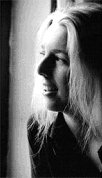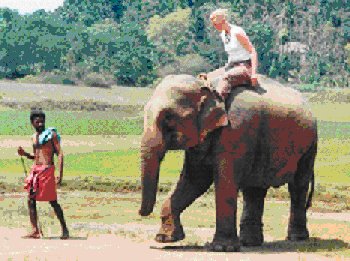
|
|

Caroline was born almost blind with a rare hereditary condition; she couldn't see anything more than two – three feet away. Glasses didn't make a lot of difference. Caroline says, “it's like wearing glasses with vaseline smeared on”.
In 1996\97 she completed a Masters in Business in Organisational Human Performance and Design for which she got first class honours and an award by the Irish Management Institute. Then she got a job with Accenture Management Consultants.
Caroline had read a book called “Travels on my Elephant” by Mark Shand – which is about a journey across north-east India on an elephant. When she was feeling sad about working long hours and her eye-sight getting worse she decided that she should do something positive with her life. Over the next ten months she set-up a charity and organised her own elephant journey.
In June 2000 Caroline set up the Aisling charity (aisling means 'dream' in irish) which fundraises for the National Council for the Blind, Sight Savers International and Protection for Asian Elephant.
Caroline wanted to open people's minds by doing the Indian Challenge. Her wish for this was to “create an adventure and inspire people into thinking of disability in a positive way.”
The journey was 1,000 km long across southern India.
Her elephant's name was Bhadra. She travelled 8 hours a day. Nothing would stop her. The safest place to sleep was the top of a battered transit van.
Meals consisted of rice, dhal(split seeds), chapattis(bread) and lots of vegetables, watermelon, mangoes and bananas.
There was always the danger of male elephants mating with Bhadra. Fortunately whenever a herd of wild elephants were near Bhadra would lift her trunk, sniff the air and made a rumbling sound in her belly. Then everybody would run and get pots and pans and made noise to frighten the elephants away and if that did not work then they would set off an elephant bomb, which was like a small loud firework that startles elephants. Surprisingly, Bhadra would barely move when the bomb went off. It was as if she knew that Caroline was trying to protect her. Sometimes she would pass a herd of wild elephants or through villages of screaming children armed with bananas!
At the end of March after two months on the road, Caroline spent three days at the Shankara Eye Hospital, which serves 14.5 million people. Fifteen surgeons work there for Sight Savers International and carry out hundreds of cataract operations every day. A fifteen-minute operation can restore sight to a blind person.
Caroline raised £250,000 for the Aisling Project by doing her trip through India. She said that she hopes her trip proves to everyone, both blind and able-bodied, that anything is possible if you really want it enough.
Caroline plans in the future to:
1: Set up “For Tara”- an organisation.
In recognition of her achievements she has been named one of the RADAR (Royal Association for Disability and Rehabilitation) UK's People of the year 2001.
The core message will be to think about disability positively, to embrace all around us with a disability and to know that we all can reach our fullest potential and fulfil our personal dreams, no matter what they are.
“I'm making a point publicly. People need to judge people, their ability to undertake a role, not to judge their disability and to know the real difference that someone with a disability can make in society and in the workforce. Understanding this begins at a young age”
It's important to be open to diversity and differences and to not judge a book by its cover. Someone with a disability can do the same job as us, they just might do it in a different way. Take responsibility for your own life, get out there and make a difference. Life isn't always easy and sometimes if you fail, you have to get up and try again.
“I'm determined to share with Ireland the real difference that people with a disability can make in society and in the workforce. I'm not unique. There are hundreds of people with a disability who have so much to offer.” Caroline Comments
 Caroline Casey is a visually impaired lady who rode across India on an elephant. She found out she was blind when she was 17.
Caroline Casey is a visually impaired lady who rode across India on an elephant. She found out she was blind when she was 17. When she got to India and had met Bhadra – her elephant, she went to do some training with an Indian mahout (elephant handler) called Jayan. She only had three months to train even though it would normally takes up to eighteen months to train properly. The other mahout Vikram did not know why Caroline wanted to learn about living and working with elephants. Caroline had to prove to them that she wanted to learn their skills. She had to wear bandages on her feet to stop her from getting rope burn.
When she got to India and had met Bhadra – her elephant, she went to do some training with an Indian mahout (elephant handler) called Jayan. She only had three months to train even though it would normally takes up to eighteen months to train properly. The other mahout Vikram did not know why Caroline wanted to learn about living and working with elephants. Caroline had to prove to them that she wanted to learn their skills. She had to wear bandages on her feet to stop her from getting rope burn.
2: To participate in “ Eighty ways around the world” in 2003.
3: She is writing a book about her Indian experience.
4: To continue with the work of the Aisling Project.
5: She plans to visit schools in the autumn
6: Give a talk at an employment conference